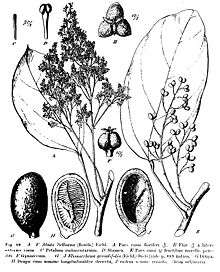Abuta
Abuta is a genus in the flowering plant family Menispermaceae, of about 32 species, native to tropical Central and South America.
| Abuta | |
|---|---|
 | |
| Abuta selloana: Illustrations A-F from A. Engler, Das Pflanzenreich 46 | |
| Scientific classification | |
| Kingdom: | Plantae |
| Clade: | Tracheophytes |
| Clade: | Angiosperms |
| Clade: | Eudicots |
| Order: | Ranunculales |
| Family: | Menispermaceae |
| Genus: | Abuta Aubl. |
| Species | |
Description
It consists in dioecious climbers or rarely erect trees or shrubs (Abuta concolor) with simple leaves. Flowers in composed panicles. Male flowers: sepals 6, in 2 whorls, petals absent, stamens 6, connate or free, introrse, anthers with a longitudinal or transverse dehiscence. Female flowers: sepals and petals as in male, staminodes 6, carpels 3, drupes ovoid, endocarp woody, condyle septiform, endosperm ruminate, embryo curved, cotyledons appressed. It is in the tropical rain forest.
Taxonomy
Abuta is usually classified in the tribe Anomospermeae Miers, together with Anomospermum Miers.
Uses
Abuta is one of the components of the arrow poison curare of some indigenous tribes of South America (especially Abuta imene from Colombia). Roots of Abuta rufescens are used as medicinal in diseases of the urogenital tract, but it is dangerous.[1]
The dichloromethane extracts of Abuta grandifolia and Minthostachys setosa (Labiatae) demonstrated high larvicidal activity against Aedes aegypti, the most active being the dichloromethane extract of A. grandifolia.[2]
Selected species
- Abuta acutifolia Miers
- Abuta amara Aubl.
- Abuta antioquiana Krukoff & Barneby
- Abuta aristeguietae Krukoff & Barneby
- Abuta barbata Miers
- Abuta boliviana Rusby
- Abuta brevifolia Krukoff & Moldenke
- Abuta brunnescens Krukoff & Barneby
- Abuta bullata Moldenke
- Abuta candicans Rich. ex DC.
- Abuta candollei Triana & Planch.
- Abuta chiapasensis Krukoff & Barneby
- Abuta chocoensis Krukoff & Barneby
- Abuta colombiana Moldenke
- Abuta concolor Poepp. & Endl.
- Abuta convexa Diels
- Abuta duckei Diels
- Abuta dwyerana Krukoff & Barneby
- Abuta ecuadoriensis Moldenke
- Abuta fluminum Krukoff & Barneby
- Abuta froesii Krukoff & Moldenke
- Abuta grandifolia (Mart.) Sandwith
- Abuta grisebachii Triana & Planch.
- Abuta guianensis Eichler
- Abuta heterophylla Miers
- Abuta imene Eichler
- Abuta klugii Moldenke ex Macbride
- Abuta limaciifolia Diels
- Abuta longa Krukoff & Barneby
- Abuta macrocarpa Moldenke
- Abuta macrophylla Miers
- Abuta manausensis Krukoff & Barneby
- Abuta mycetandra Krukoff & Barneby
- Abuta negroensis Krukoff & Moldenke
- Abuta oblonga Miers
- Abuta oblongifolia Miers
- Abuta obovata Diels
- Abuta pahni Krukoff & Barneby
- Abuta panamensis (Standl.) Krukoff & Barneby
- Abuta panurensis Eichler
- Abuta parvifolia Rusby ex Moldenke
- Abuta platyphylla Mart. ex Eichler
- Abuta pullei Diels
- Abuta racemosa Triana & Planch.
- Abuta rufescens Aubl. *
- Abuta sadwithiana Krukoff & Barneby
- Abuta scandens DC.
- Abuta seemanni Triana & Planch.
- Abuta selloana Eichler
- Abuta solimoesensis Krukoff & Barneby
- Abuta soukupi Moldenke
- Abuta spicata Triana & Planch.
- Abuta splendida Krukoff & Moldenke
- Abuta steyermarkii (Standl.) Standl.
- Abuta tomentosa Sagot ex Benth.
- Abuta toxifera Baill. ex Krukoff & Moldenke
- Abuta trinervis (Rusby) Moldenke
- Abuta umbellata Sagot ex Benth.
- Abuta vaupesensis Krukoff & Barneby
- Abuta velutina Gleason
- Abuta verruculosa Krukoff & Barneby
- Abuta wilson-brownei R.S.Cowan
See also
References
- Mabberley, D. J. (1997). The Plant-Book (2nd ed.). Cambridge, U.K.: Cambridge University Press. ISBN 0-521-41421-0. LCCN 96030091.
- Ciccia, G.; Coussio, J.; Mongelli, E. (2000). "Insecticidal activity against Aedes aegypti larvae of some medicinal South American plants". Journal of Ethnopharmacology. 72 (1): 185–189. doi:10.1016/S0378-8741(00)00241-5. PMID 10967471.
Further reading
- Diels, L. (1910). "Menispermaceae". In Engler, A. (ed.). Das Pflanzenreich (in Latin and German). IV.94 (Fasc. 46). Leipzig (Germany): Engelmann. [monographic revision of the genus]
- Barneby, R. C.; Krukoff, B. A. (1971). "Supplementary Notes on American Menispermaceae VIII. A Generic Survey of the American Triclisieae and Anomospermeae". Memoirs of the New York Botanical Garden. 22 (2): 30–52. ISBN 978-0-89327-075-9. [taxonomic partial revision]
- Kessler, P. J. A. (1993). Kubitzki, K. (ed.). Flowering plants, dicotyledons : magnoliid, hamamelid, and caryophyllid families. The Families and Genera of Vascular Plants. 2. Berlin: Springer-Verlag. ISBN 3-540-55509-9. LCCN 93019190.